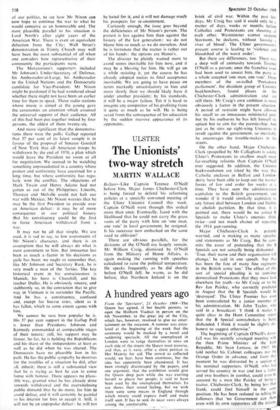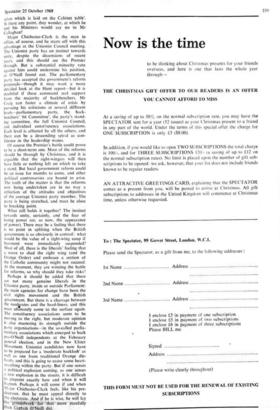ULSTER
The Unionists' two-way stretch
MARTIN WALLACE
Belfast—Like Captain Terence O'Neill before him, Major James Chichester-Clark is being forced to defend his reforming policies at a specially convened meeting of the Ulster Unionist Council this week. Captain O'Neill went through this ordeal more than once. Eventually, faced with the likelihood that he could not carry the grass roots of the party with him on 'one man, one vote' in local government, he resigned. Is his successor now embarked on the same road to oblivion?
There are obvious parallels, for the divisions of the O'Neill era largely remain. Mr William Craig, dismissed by O'Neill from the Ministry of Home Affairs, is again making the running with speeches calculated to raise the political temperature. He speaks frequently, as he did shortly before O'Neill fell; he warns, as he did before, that Northern Ireland is on the
brink of civil war. Within the past fm days, Mr Craig has said it could only be a matter of days, weeks or months before Catholics and Protestants are shooting at each other. Westminster cannot suspend Stormont, he declares, without 'loosing a river of blood'. The Ulster government's present course is leading to 'violence and bloodshed of the worst order'.
But there are differences, too. There u;,, a deep well of animosity towards Terence O'Neill as a person; once the franchise issue had been used to unseat him, the party a, a whole accepted 'one man, one vote'. Three members of the so-called 'Portadovn parliament', the dissident group of Unionist backbenchers, found places in the Chichester-Clark administration and are still there. Mr Craig's own ambition is more obviously a factor in the present situation A period of restraint might have allowed his recall to an innocuous ministerial post. but by his outbursts he has left himself no option but to aim for the premiership. And just as he stirs up right-wing Unionists to revolt against the government, so inevitabl■ he encourages the trouble-makers in the streets.
On the other hand, Major Chichester- Clark (propelled by Mr Callaghan) is asking Ulster's Protestants to swallow much more far-reaching reforms than Captain O'Neill ever suggested. In addition, the Unionist backwoodsmen are irked by the way that Catholic enclaves in Belfast and London- derry have been able to keep out the normal forces of law and order for weeks at a time. They have seen the administration capitulate to the British government, and wonder if it would similarly capitulate to any future deal between London and Dublin to abolish partition. By that time, it is pointed out, there would be no armed B Specials to make Ulster's enemies think twice—and not much chance of repeating the 1914 gun-running.
Major Chichester-Clark is patently worried, and is making as many speeches and statements as Mr Craig. But he com- mits the error of pretending that the B Specials are not actually being disbanded— 'True, their name and their organisation will change,' he said in one speech, 'but that has been the fate of many fine regiments in the British army too.' The effect of this sort of special pleading is to convince demoralised Protestants that they must look elsewhere for truth—to Mr Craig or to the Rev Ian Paisley, who correctly predicted in August that the B Specials would be 'destroyed'. The Ulster Premier has even ,been contradicted by a junior member of his administration, Mr John Taylor. who said in a broadcast: 'I think it makes ii quite clear in the Hunt Committee report that the B Special constabulary is being disbanded. I think it would be slightly dis- honest to suggest otherwise.'
The beginning of Captain O'Neill's do,An- fall was his secretly arranged meeting with the then Prime Minister of the Irish Republic, Mr Sean Lemass, in 1965. He told neither his Cabinet colleagues nor the Orange Order in advance, and from that moment he was distrusted by a section of his nominal supporters. O'Neill, who had served his country in war and lost a father and two brothers in combat, could even be accused by a man like Paisley of being a traitor. Chichester-Clark, by being less than frank, could find himself in the same position. He has been reduced to telling his followers that `no Government can share even with its own supporters all the infornl-
ation which is laid on the Cabinet table'. Is there any point, they wonder, at which he and his Ministers would say no to Mr Callaghan?
Major Chichester-Clark is the man in office, of course, and he starts off with this advantage at the Unionist Council meeting. The Unionist party has an instinct towards unity, despite the dissensions of recent ears and this should see the Premier through. But a substantial minority vote against him could undermine his position. as O'Neill found out. The parliamentary party has accepted the government's reform proposals—though it may want a more detailed look at the Hunt report—but it is doubtful if these command real support from the majority of backbenchers. Mr Craig can foster a climate of crisis by pursuing his criticisms at several different levels—parliamentary party, the back- benchers' 66 Committee', the party's stand- ing committee, the full Unionist Council, and individual constitutency associations. Each level is affected by all the others, and there can be a descending spiral as con- fidence in the leadership wanes.
Of course the Premier's battle could prove to be a short-term one. Most of the reforms should be through by Christmas, and it is arguable that the right-wingers will then have little or nothing left on which to take a stand. But local government reform could be an issue for months to come, and other political controversies are bound to arise. The truth of the matter is that the reforms now being undertaken are in no way a reflection of the attitudes and objectives of the average Unionist party member. The party is being stretched, and must be close to breaking point.
What still holds it together? The instinct towards unity, certainly, and the fear of losing power (or, as now, the appearance of power). There may be a feeling that there is no point in splitting when the British government is so obviously in control: what would be the value of a right-wing coup if Stormont were immediately suspended? Most of all, there is the liberals' feeling that a move to shed the right wing (and the Orange Order) and embrace a section of the Catholic community might not succeed. At the moment, they are winning the battle for reforms, so why should they take risks?
Perhaps it should be added that there are not many genuine liberals in the Unionist party, inside or outside Parliament: the main agencies for change have been the civil rights movement and the British government But there is a cleavage between the modirates and the hard-liners, and this must ultimately come to the surface again. The constituency associations seem to be moving to the right, but moderate opinion Is also mustering its strength outside the party organisations—in the so-called parlia- mentary associations which emerged to back Pro-O'Neill independents at the February general election, and in the New Ulster Movement. Unionist candidates now have to be prepared for a 'moderate backlash' as well as one from traditional Orange die- hards, and this is going to cause some heart- searching within the party. But if one senses a political explosion coming, as one senses a new explosion in the streets, it is difficult to pinpoint exactly how and when it will happen. Perhaps it will come if and when Major Chichester-Clark feels, like his pre- decessor, that he must appeal directly to the electorate. And if he is wise, he will lay he groundwork for that more carefully
an Captain O'Neill did.



















































 Previous page
Previous page